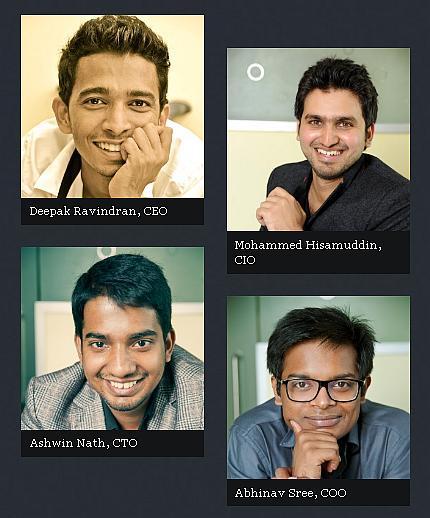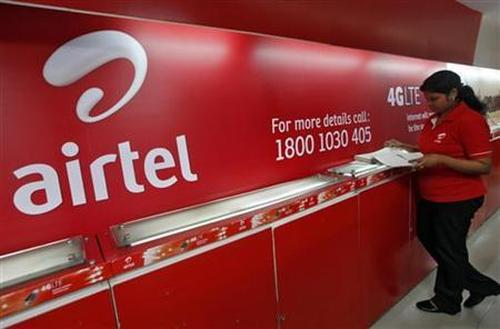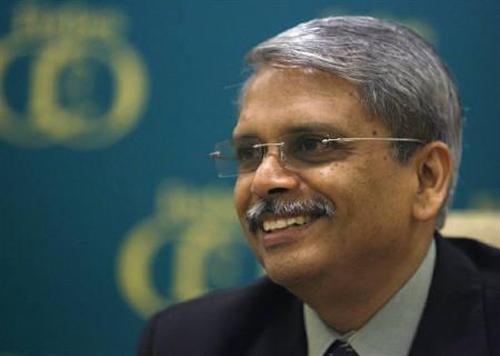 | « Back to article | Print this article |
How these college dropouts started a successful tech biz
Apple founder Steve Jobs had famously asked, "Why join the navy if you can be a pirate?"
For Deepak, Hisam, Abhinav and Ashwin, four dropouts from LBS Engineering College in Kasargod, a small town in north Kerala, these words became a driving force.
The young boys developed an idea to link the gaps between the online and offline worlds. Their system was based on a simple idea - delivering the power of the internet on phones that couldn't access the web, using the SMS technology.
In 2008, during their sixth semester at the engineering college, they incorporated Innoz Technologies. The company started commercial operations in 2011.
Its first product was SMS Gyan, a search engine for phones without internet, a patented push-back service application working through an algorithm. Through this platform, mobile phone users can SMS a query to a particular number.
The company's server collects information from partner websites such as Wikipedia, Bing and Zomato send back answers within seconds. Users can enter the query in English or Hindi (typed in the English alphabet).
Click NEXT to read more...
Complete coverage: Union Budget 2013-14
Budget Impact Live!
How these college dropouts started a successful tech biz
On how the idea of SMS-based search came up, Deepak Ravindran, chief executive, said, "Hisam was in transit and trying to understand the meaning of a word. But with his phone, he was not able to connect to the internet. For us, that was a eureka moment. We sat together and thought we should do something to address this. And, Innoz happened."
According to a recent report by the Internet and Mobile Association of India, of the 904 million mobile users in the country, only 78.7 million use mobile internet.
The report added the number of users accessing internet through mobile devices would surpass 100 million by March 2014.
The Beginning
SMS Gyan was conceived in a college and gained popularity by word of mouth, growing into a commercial venture.
Later, the four-member team thought of a market opportunity beyond the curriculum and decided to turn the project into a business venture.
Commercial operations were formally kicked off when Innoz was selected for the iAccelerator programme at the Indian Institute of Management, Ahmedabad. It received angel funding from Freeman Murray.
"We were lucky to have been selected for the iAccelerator programme. It gave us an opportunity to learn. To take part in the programme, we decided to quit college and take up a new course in our lives," says Ravindran.
Click NEXT to read more...
Complete coverage: Union Budget 2013-14
Budget Impact Live!
How these college dropouts started a successful tech biz
The team approached Techno Park in Thiruvananthapuram and secured space at the park's incubation centre, Innoz's first physical office.
As the company was focusing on the mobile space, the opportunity in Kerala was limited; most telecom service providers are headquartered in Delhi.
Slowly, the team strength rose to 20 and Deepak shifted to Delhi to meet potential clients. After entering the country's telecom hub with a young team (average age of 23), Innoz faced various challenges in securing its first contract.
"When we moved to Delhi, the first challenge was to meet clients. We were all young. One day, when I was sitting in a coffee shop near a Bharti Airtel office, I met a senior official from that company. I introduced myself and spoke about our company. He was quite positive about the whole idea and Bharti came on board as our first user," Ravindran said.
Initial Success
Airtel was the first service provider in the country to roll out the SMS Gyan service. Any Airtel user can SMS a query to 55444. Service providers charge the user Rs 1 a query and offer a package for Rs 30 a month.
The service provider gets about 70 per cent of the revenue; the rest goes to Innoz.
Click NEXT to read more...
Complete coverage: Union Budget 2013-14
Budget Impact Live!
How these college dropouts started a successful tech biz
After seeing the success of the value-added service provided by Airtel, other service providers such as Vodafone, Idea, Airtel and BSNL followed.
"We find a lot of traction for services such as 55444 and a lot of customers who have used these services turn out to be repeat users. We have seen our revenues growing consistently since the launch of the service," said a Vodafone India spokesperson.
"We have users who need day-to-day information, entertainment and updates. The SMS Gyan service attracts customers who like exploring and finding new things through SMS at an affordable price."
In the first 18 months of its operations, Innoz answered a billion queries through SMS Gyan. Currently, it has about 120 million active users, and responds to about five million queries a day.
The company adds one to two million users every month. Last year, its revenue stood at Rs 6 crore (Rs 60 million). By the end of 2014-15, it expects its revenue to be Rs 100-200 crore (Rs 1-2 billion).
Last year, the company raised about $3 million from Seedfund, an early-stage venture capital fund, in return for a minority stake in the company.
Innoz has now shifted its headquarters from Kerala to Bangalore and has a team of about 45 people. It also has offices in Delhi and Mumbai.
Click NEXT to read more...
Complete coverage: Union Budget 2013-14
Budget Impact Live!
How these college dropouts started a successful tech biz
Sanjay Vijayakumar, co-founder and chief executive, MobME Wireless Solutions, said, "The Innoz team is young and has young ideas. It is addressing a niche market. Though people say mobile penetration is growing, there are millions of people not using internet on phones. The company is placed in a sweet spot - between feature phones and smartphones."
The Future
Many industry veterans have said the company is too young and the initial success would be retained only when new models are tried and new revenue streams and products are launched.
On condition of anonymity, a person close to the start-up ecosystem said, "Globally and in India, we have seen many examples of companies recording initial success. But due to the lack of a clear vision, strategies, products and management, they fail to capitalise on this."
With the venture capital raised, the mobile search engine plans to widen its reach to other emerging markets such as South Africa, Sri Lanka, Indonesia, Nepal, West Asia and other countries in the South Asian Association for Regional Cooperation region.
For additional revenue, the company is scouting for diverse means, including mobile advertisement. Through such advertising, Innoz plans to push advertisements based on user behaviour.
Click NEXT to read more...
Complete coverage: Union Budget 2013-14
Budget Impact Live!
How these college dropouts started a successful tech biz
"We believe mobile advertisement is another area of growth. We are carrying out trials and looking at lead generation through our technology," said Ravindran.
"Innoz is also working on other customer-friendly services and applications on SMS and unstructured supplementary service data. We feel there is good potential for such products," said a Vodafone India spokesperson.
Innoz is in the final rounds of talks with internet companies such as Google, Facebook and Twitter to offer services on their offline platforms.
From March, feature phone users can access Facebook, Gmail and some other websites through Innoz's unique platform, without internet connectivity.
Expert Take
Deepak and the founding team of Innoz have tapped an important niche - the need for ordinary phones and users to be connected to the internet, or, as they term it, internet for offline people.
When you have a compelling vision such as this, one that can change the world, it is bound to succeed. They have achieved critical mass and are profitable.
This is the second milestone for a start-up. Now, they need to scale up the offering, to dominate the space globally. There is an opportunity to take these services to all the countries in the developing world.
Click NEXT to read more...
Complete coverage: Union Budget 2013-14
Budget Impact Live!
How these college dropouts started a successful tech biz
As they do this, they also need to identify other products and services and create multiple revenue streams. For this, they would have to invest in research and development and collaborate with other research organisations.
Longevity is the true measure of success of an organisation. Deepak has to focus on creating an institution that continues to provide solutions to its consumers and employment to people.
There is a responsibility on Deepak and the team to succeed. They have to inspire others to take up entrepreneurship. Deepak is already involved with Startup Village and is a spokesperson for the start-up ecosystem in Kerala.
Though Innoz is still small, Deepak and the others are mentoring and funding other start-ups. As Innoz grows, an ecosystem for start-ups is being built in parallel.
S Gopalakrishnan, co-founder & executive co-chairman, Infosys







